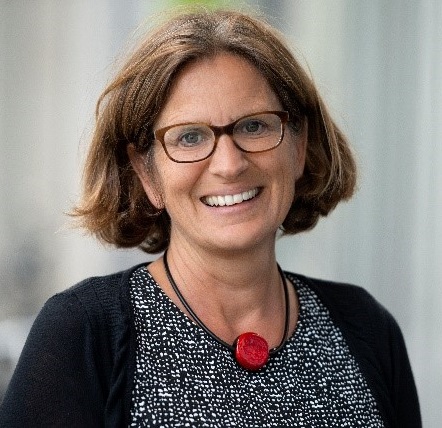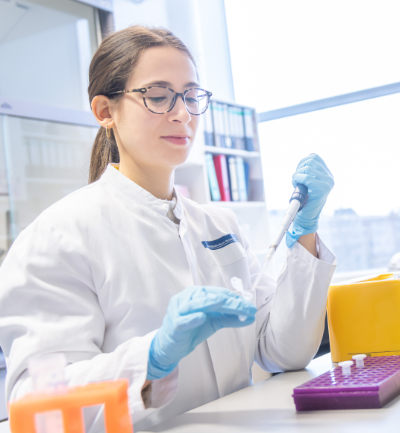[Translate to En:](Kopie 1)
[Translate to En:](copy 1)
Focusing on iron metabolism
The 'Center for Translational, Biomedical Iron Metabolism Research' headed by Prof. Dr. Martina Muckenthaler is engaged in the study of iron metabolism.
Our research aims to understand how the body ensures the life-saving balance between sufficient iron supply and avoidance of iron overload. We develop strategies to understand diseases of impaired iron metabolism as well as therapeutic interventions.
Prof. Muckenthaler's research group is part of the MMPU (Molecular Medicine Partnership Unit) and thus works closely with Prof. Dr. Matthias Hentze's department at the European Molecular Biology Laboratory (EMBL).
Hemochromatosis
Anemia affects billions of people worldwide. It occurs when insufficient iron is provided for the production of red blood cells. At the other end of the spectrum is the iron overload disorder hemochromatosis, the most common genetic disorder in the Caucasian population. Our research is concerned with the mechanisms that maintain iron homeostasis. These ensure that organs and cells receive sufficient iron while preventing iron overload. Iron levels are maintained within the physiological range by a hormonal system called the hepcidin/ferroportin regulatory axis. The peptide hormone hepcidin is produced by the liver and controls iron fluxes by degrading the iron exporter ferroportin. Our research aims to understand how iron metabolism is controlled under conditions of iron overload, inflammation, or high iron demand for red blood cell synthesis.
Tumor-associated macrophages (TAMs)
A second line of research focuses on the role of iron in the tumor microenvironment. There, tumor-associated macrophages (TAMs) support angiogenesis and matrix remodeling and modulate both innate and adaptive immune responses to allow tumor growth and metastasis to progress. Our work demonstrated that in hemorrhagic areas of solid tumors, TAMs phagocytose red blood cells exuding from vessels. The resulting iron accumulation causes TAMs to be reprogrammed to a proinflammatory anti-cancer phenotype. The presence of iron-loaded TAMs correlates with reduced tumor size and improved overall survival of tumor patients. We are currently testing 'core cross-linked polymeric micelles' to enrich iron in the tumor microenvironment in in vivo tumor models as an anti-tumor agent.
Bauer TA, Horvat NK, Marques O, Chocarro S, Mertens C, Colucci S, Schmitt S, Carrella LM, Morsbach S, Koynov K, Fenaroli F, Blümler P, Jung M, Sotillo R, Hentze MW, Muckenthaler MU, Barz M. Core Cross-Linked Polymeric Micelles for Specific Iron Delivery: Inducing Sterile Inflammation in Macrophages. Adv Healthc Mater. 2021 Oct;10(19):e2100385.
Pasricha S-R, Tye-Din J, Muckenthaler MU, Swinkels D. Clinical Seminar: Iron Deficiency. The Lancet. 2021 Jan 16;397(10270):233-248.
Vinchi F, Porto G, Simmelbauer A, Altamura S, Passos ST, Garbowski M, Silva AMN, Spaich S, Seide SE, Sparla R, Hentze MW, Muckenthaler MU. Atherosclerosis is aggravated by iron overload and ameliorated by dietary and pharmacological iron restriction. Eur Heart J. 2020 Jul 21;41(28):2681-2695.
Muckenthaler MU, Rivella S, Hentze MW, Galy B. A Red Carpet for Iron Metabolism. Cell. 2017;168(3):344–61.
Costa da Silva M, Breckwoldt MO, Vinchi F, Correia MP, Stojanovic A, Thielmann CM, Meister M, Muley T, Warth A, Platten M, Hentze MW, Cerwenka A, Muckenthaler MU. Iron Induces Anti-tumor Activity in Tumor-Associated Macrophages Frontiers in Immunology, 8. 2017.
Vinchi F, Costa da Silva M, Ingoglia G, Petrillo S, Brinkman N, Zuercher A, Cerwenka A, Tolosano E, Muckenthaler MU. Hemopexin therapy reverts heme-induced proinflammatory phenotypic switching of macrophages in a mouse model of sickle cell disease. Blood. 2016;127(4):473–86.
Guida C, Altamura S, Klein FA, Galy B, Boutros M, Ulmer AJ, Hentze MW, Muckenthaler MU. A novel inflammatory pathway mediating rapid hepcidin-independent hypoferremia. Blood. 2015;125(14):2265–75.
Mleczko-Sanecka K, Roche F, da Silva AR, Call D, d'Alessio F, Ragab A, Lapinski PE, Ummanni R, Korf U, Oakes C, Damm G, D'Alessandro LA, Klingmüller U, King PD, Boutros M, Hentze MW, Muckenthaler MU. Unbiased RNAi screen for hepcidin regulators links hepcidin suppression to proliferative Ras/RAF and nutrient-dependent mTOR signaling. Blood. 2014;123(10):1574–85.
Altamura S, Kessler R, Gröne H-J, Gretz N, Hentze MW, Galy B, Muckenthaler MU. Resistance of ferroportin to hepcidin binding causes exocrine pancreatic failure and fatal iron overload. Cell Metab. 2014;20(2):359–67.
Castoldi M, Vujic Spasic M, Altamura S, Elmén J, Lindow M, Kiss J, Stolte J, Sparla R, D'Alessandro LA, Klingmüller U, Fleming RE, Longerich T, Gröne HJ, Benes V, Kauppinen S, Hentze MW, Muckenthaler MU. The liver-specific microRNA miR-122 controls systemic iron homeostasis in mice. J Clin Invest. 2011;121(4):1386–96.
Vujić Spasić M, Kiss J, Herrmann T, Galy B, Martinache S, Stolte J, Gröne H-J, Stremmel W, Hentze MW, Muckenthaler MU. Hfe acts in hepatocytes to prevent hemochromatosis. Cell Metab. 2008;7(2):173–8.
Roy CN, Custodio AO, Graaf J de, Schneider S, Akpan I, Montross LK, Sanchez M, Gaudino A, Hentze MW, Andrews NC, Muckenthaler MU. An Hfe-dependent pathway mediates hyposideremia in response to lipopolysaccharide-induced inflammation in mice. Nat Genet. 2004;36(5):481–5.
Muckenthaler M, Roy CN, Custodio AO, Miñana B, deGraaf J, Montross LK, Andrews NC, Hentze MW. Regulatory defects in liver and intestine implicate abnormal hepcidin and Cybrd1 expression in mouse hemochromatosis. Nat Genet. 2003;34(1):102–7.
- Sandro Altamura (Postdoc)
- Christina Mertens (Postdoc)
- Oriana Marques (Postdoc)
- Marlène Le Tertre (Postdoc)
- Ruiyue Qiu (Postdoc)
- Violante Oliveira (Postdoc)
- Anand Ruban Agarvas (PhD-Student)
- Alessia Polverino (PhD-Student)
- Tiago Carvalho Oliveira (PhD-Student)
- Stefania Cucinelli (PhD-Student)
- Katja Müdder (techn. Assistentin)
- Richard Sparla (techn. Assistent)
- Elke Lebesmühlbacher (persönl. Assistentin)

Postal address:
Div. Pediatric Oncology, Immunology, and Hematology
University Clinic Heidelberg
Im Neuenheimer Feld 350
D- 69120 Heidelberg
Germany


